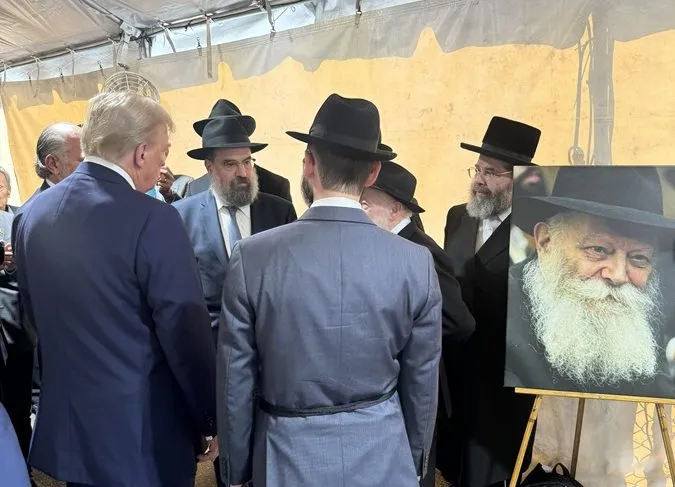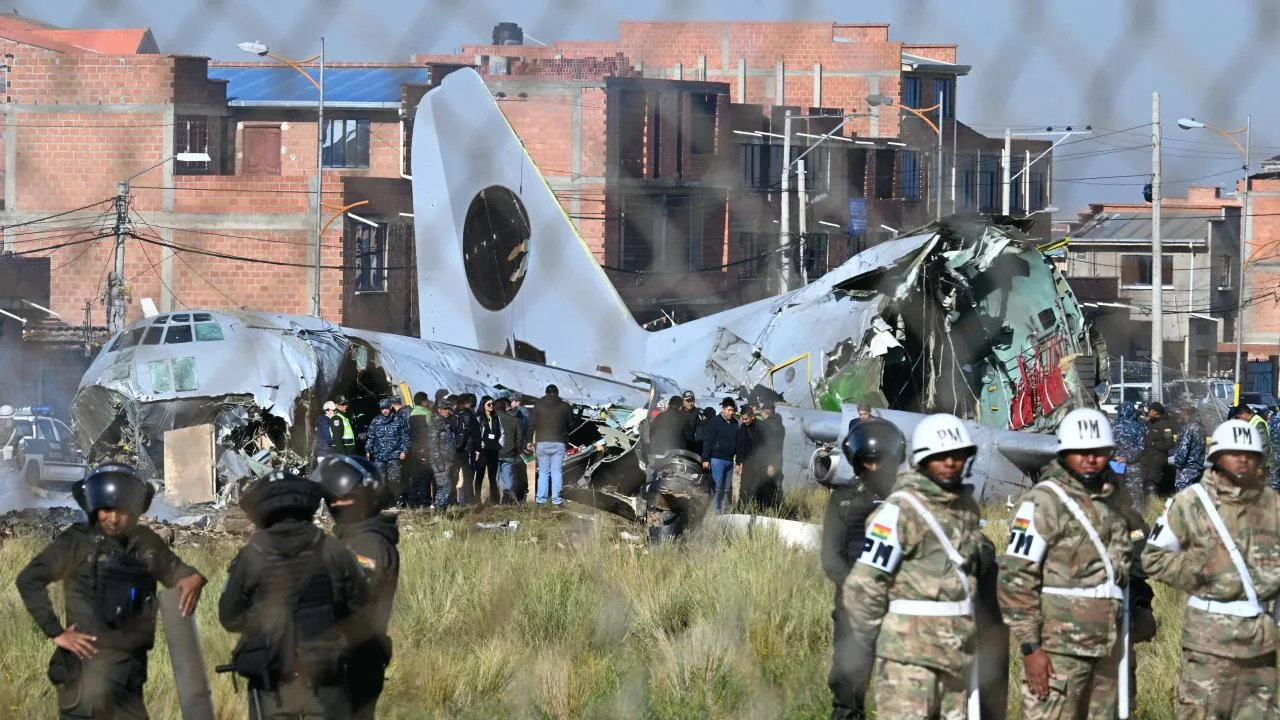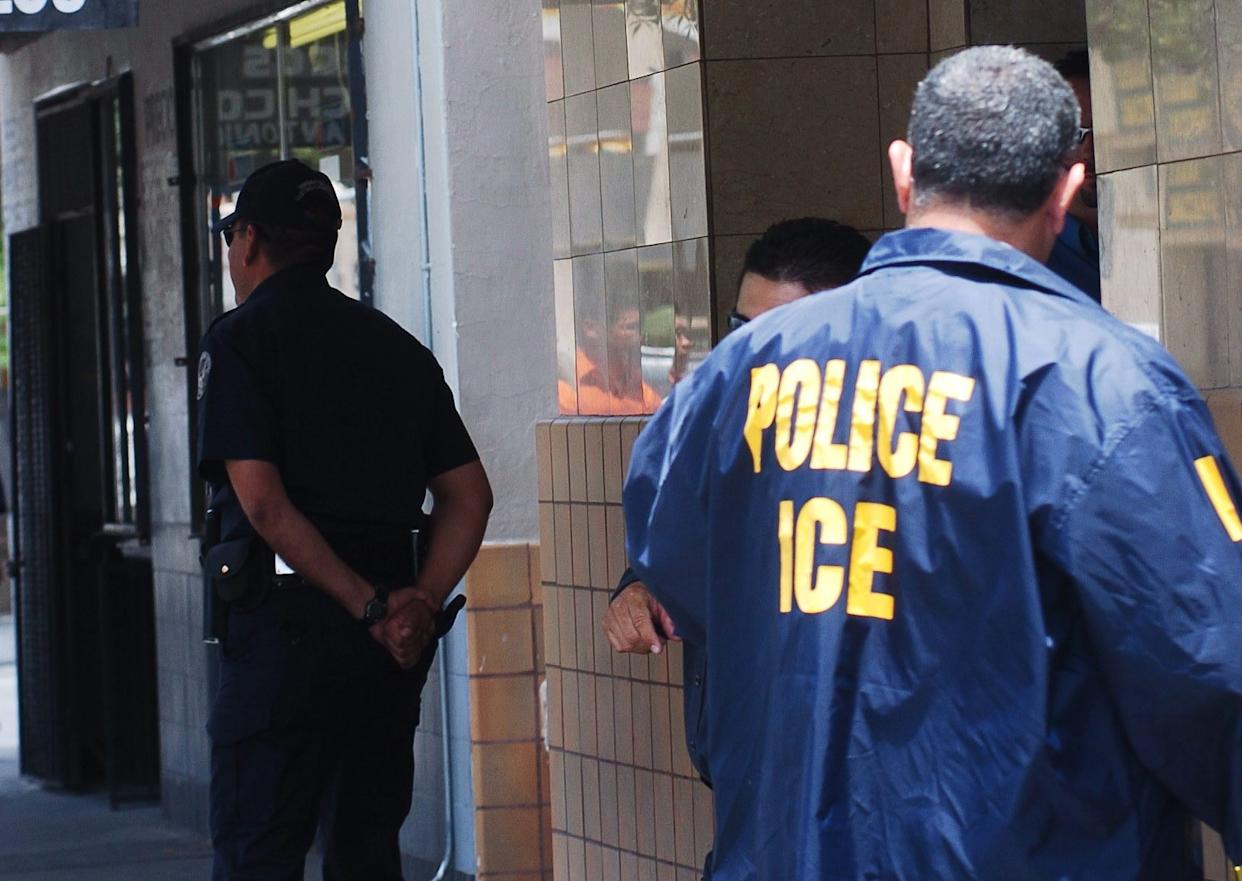International
Harris and Trump commemorate the anniversary of the attack on Israel with symbolic acts

US Vice President Kamala Harris planted a pomegranate in her official residence on Monday, while Former President Donald Trump visited the grave of a prominent rabbi in New York, in acts of great symbolic content to commemorate the first anniversary of Hamas’ attack against Israel.
Both candidates sought to give a solemn air to the day with gestures that reaffirmed their commitment to Israel and, although they tried to maintain an institutional tone, the ceremonies acquired a clear political dimension less than a month before the November 5 elections.
“Today we plant a pomegranate in this garden because, in Judaism, it is a symbol of hope and virtue,” Harris said in statements to the press, in which she said she felt “devastated by the pain and loss” caused a year ago by the Hamas attack, which left 1,200 dead and took 251 hostages.
Trump and Harris star in symbolic acts for Israel
Harris reaffirmed his commitment that he will “always” ensure that Israel has the means to defend itself, but also considered that the world must work to alleviate the “immense suffering” of the Palestinians of the Gaza Strip, who have experienced “so much pain and so much loss during this year.”
In addition, in response to questions from the press, he said that he will not “surrender” in attempts to reach an agreement between Israel and Hamas for a ceasefire in Gaza and the release of Israeli hostages.
The vice president, like US President Joe Biden, has reiterated her support for Israel at all times, but has spoken with a firmer language about the suffering in the Gaza Strip, where the Israeli offensive has already left more than 41,900 fatalities.
Trump visits the grave of a key figure for Orthodox Jews
For his part, Trump visited in New York the grave of Rabbi Menachem Mendel Schneerson, a prominent figure of Orthodox Judaism who led the Jabad-Lubavitch movement for more than four decades until his death in 1994.
Known as the “Rebe of Lubavitch”, Schneerson was the seventh leader of this religious current and some considered him a messianic figure, although the Jabad movement has officially denied any interpretation in this regard.
With a black kippá on his head, Trump, who belongs to the Presbyterian Church, deposited a stone on the tombstone of Schneerson’s tomb, following a Jewish custom. In addition, in front of the cameras, he broke into pieces a small piece of paper on which he had apparently left a message for the rabbi and left it inside the mausoleum.
Trump did not make statements to the press at that event, but he will address the media this afternoon in Miami.
In a statement, Karoline Leavitt, one of the Republican spokespeople, reiterated that if the former president had been in the White House, the Hamas attacks “would never have happened.”
Biden lights a candle to honor the victims
Meanwhile, Biden and the first lady, Jill Biden, participated this Monday in a ceremony with a rabbi in which they lit a yahrzeit candle, used in Judaism to honor the memory of the deceased, and kept a moment of silence to remember the victims of Hamas.
The ceremony was officiated by Rabbi Aaron Alexander of the Adas Israel Congregation, a family friend of the American-Israeli Hersh Goldberg-Polin, who was taken hostage by Hamas and whose body was found at the end of August in a tunnel in Rafah, in the Gaza Strip.
Although Biden did not speak during the event, in the morning he issued a statement in which he reaffirmed his commitment to Israel’s right to defend itself after the Hamas attacks, while reiterating his government’s determination to achieve a ceasefire in Gaza that allows the release of the hostages.
Condolences from the United States
“We will not give up until we bring the hostages home,” he said in his statement.
In addition, Biden spoke on the phone on Monday with the President of Israel, Isaac Herzog, to express his condolences on the anniversary of the attack.
The president, however, did not call the Israeli Prime Minister, Benjamin Netanyahu, with whom he has not spoken since August 21 and with whom he maintains an increasingly tense relationship after the failed attempts of the United States to reach an agreement between Israel and Hamas that allows a ceasefire and release the hostages.
International
Bolivia Orders Three Investigations Into Deadly Military Plane Crash

Bolivia’s Defense Minister Marcelo Salinas announced Monday that three separate investigations will be conducted into Friday’s crash of a military cargo aircraft at El Alto International Airport, near La Paz, which left at least 22 people dead.
The Hercules aircraft, operated by the Fuerza Aérea Boliviana (FAB), was transporting cash intended for the Central Bank of Bolivia when it overshot the runway after landing from the city of Santa Cruz. The plane reportedly traveled nearly one kilometer beyond the airport perimeter.
The incident sparked chaotic scenes, with individuals attempting to collect scattered banknotes. Authorities detained 51 people in the aftermath, and the government declared three days of national mourning.
Multiple Investigations Underway
The first inquiry is being led by a military board from the Bolivian Air Force, which has already taken custody of the aircraft’s black box for analysis.
Minister Salinas said two additional investigations will follow — one conducted by the insurance company and another by the aircraft’s manufacturer.
“At least two more investigations will come, that of the insurance company and that of the aircraft manufacturer,” Salinas said during a press conference in Santa Cruz.
He cautioned that the investigative process could take between three and six months, noting that the black box cannot be opened in Bolivia due to the lack of specialized laboratories for analysis.
Awaiting Official Findings
Salinas stressed that the FAB investigative board is the highest authority in the case and urged the public to wait for its conclusions to avoid speculation about the causes of the crash.
He also confirmed that the government has contacted the families of the 22 victims and the 37 injured, as well as the owners of 15 damaged vehicles, to coordinate procedures with the insurer and cover the corresponding expenses.
International
Mexico Calls for Immediate Probe After National Dies in ICE Custody

Mexico’s Secretaría de Relaciones Exteriores (SRE) on Monday called on U.S. authorities to conduct an “immediate and thorough” investigation into the death of a Mexican national while in custody of U.S. Immigration and Customs Enforcement (ICE) at a processing facility in California.
In a statement, the Mexican government described the death as “regrettable” and urged U.S. officials to clarify the circumstances surrounding the case in order to “determine responsibilities and ensure that such events do not happen again.”
Death at Adelanto Processing Center
According to available information, the Mexican citizen died at the Adelanto Processing Center in California while under ICE custody. Authorities have not yet released the individual’s identity or the cause of death.
Following the incident, Mexico’s Foreign Ministry formally requested “detailed information” from U.S. authorities, including the detainee’s medical records and custody reports.
Consular Assistance Activated
The Mexican Consulate in San Bernardino, California, has activated consular assistance protocols to provide ongoing support to the deceased’s family. Officials have contacted relatives to express condolences and offer legal guidance, as well as assistance with the necessary procedures to repatriate the remains.
“The handling of situations like this and the establishment of mechanisms to resolve them are priorities for the Government of Mexico,” the Foreign Ministry said, adding that it will formally request an investigation into any systemic conditions that may have contributed to such incidents.
Local Mexican media reported that seven Mexican nationals died while in ICE detention last year — the highest number recorded since the agency was created.
International
Anti-ICE Billboard Campaign Targets Immigration Spending in 31 U.S. Cities

More than 200 billboards criticizing U.S. Immigration and Customs Enforcement (ICE) began appearing Monday in 31 cities across the United States, including Miami, as part of a campaign highlighting the high cost of immigration enforcement operations for taxpayers.
The initiative, titled “ICE Costs Us,” was launched by the civil rights organization Mijente and will run for four weeks.
Criticism of Spending and Enforcement Tactics
The billboards feature images of ICE agents during arrests or carrying military-style weapons. According to the organization, spending on military-grade equipment for the agency has increased by 600 percent in recent years.
Several signs display messages such as:
“Your taxes are being wasted” and “ICE’s cruelty costs you $28 billion,” referring to the agency’s annual budget.
In a statement, Marisa Franco, co-founder of the Mijente Support Committee, said:
“For too long, our government has prioritized building cages and investing billions in an immigration enforcement apparatus that has left families torn apart and communities terrified.”
She added that “Millions of Americans are living paycheck to paycheck, yet this violent agency continues operating with a blank check. These decisions do not make us safer nor improve our economic security. Our billboards highlight these choices and demand a different path.”
Budget Debate and Medicaid Comparison
The campaign also draws a comparison between ICE’s funding and the estimated 17 million people who could lose health coverage under Medicaid due to federal budget cuts under President Donald Trump.
Other billboard messages seen in various cities include:
“They get billions to beat us; we get layoffs and rising rents” and “Funding ICE is a fast track to fascism.”
Organizers say the goal is to spark public debate about the allocation of federal funds for immigration enforcement and the broader economic and social impact of such policies on communities nationwide.
-

 International2 days ago
International2 days agoIran Reports 201 Dead, 747 Injured After U.S. and Israeli Strikes
-

 International5 days ago
International5 days agoCocaine Production Surges 34% in 2023 as Market Expands into Africa and Asia
-

 International4 days ago
International4 days agoTrump Floats “Friendly Takeover” of Cuba Amid Rising Tensions
-

 Sin categoría3 days ago
Sin categoría3 days agoTrump: ‘We Think It’s True’ Amid Claims Iran’s Supreme Leader Was Killed
-

 International3 days ago
International3 days agoSecurity Council to Hold Emergency Meeting on Middle East Crisis
-

 International2 days ago
International2 days agoPope Leo XIV Urges End to ‘Spiral of Violence’ in Middle East
-

 International5 days ago
International5 days agoFederal Judge Blocks Trump Policy Allowing Deportations to Third Countries
-

 International4 days ago
International4 days agoArgentina’s Senate Reviews Milei-Backed Labor Overhaul
-

 International18 hours ago
International18 hours agoBrazil’s Supreme Court Rejects Bolsonaro’s Bid for House Arrest
-

 International5 days ago
International5 days agoClinton Accuses Republican Committee of Using Epstein Case to Shield Trump
-

 International18 hours ago
International18 hours agoAnti-ICE Billboard Campaign Targets Immigration Spending in 31 U.S. Cities
-

 International18 hours ago
International18 hours agoTrump Warns of ‘Major Wave’ of Attacks as Iran Conflict Escalates
-

 International18 hours ago
International18 hours agoMexico Calls for Immediate Probe After National Dies in ICE Custody
-

 Central America18 hours ago
Central America18 hours agoPanama Canal Monitoring Trade as Middle East Conflict Disrupts Shipping
-

 International18 hours ago
International18 hours agoBolivia Orders Three Investigations Into Deadly Military Plane Crash




























